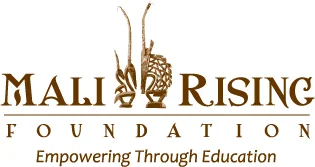In Mali, only 1 in three girls will be able to finish middle school. Many pressures drive girls away from school – from child marriage to economic needs to out-dated beliefs about a woman’s rôle. Our Girls’ Project works to address the range of pressures on girls but my small part is to work with boys throughout the school year to help them understand how they can help change things – how they can speak up for their sisters and female classmates.
Making Sure Girls Have Options
Young people in Mali face many challenges, particularly if they are female. Education helps girls (and boys!) by providing them options for their future, but sometimes the traditional route to unemployment is barred. That’s why the Girls’ Project encourages young women to think creatively about their career options.
Something as Simple as a Flashcard
Students in Mali often struggle with something most US students don’t need to worry about: language. School is taught in French, but most children speak local languages at home. If they fall behind in learning French, every other subject suffers. That’s where Mali Rising’s FLIP campaign comes in — it aims to help incoming 7th graders jumpstart their French skills for middle school.
Celebrating Girls' Education in the Villages
It’s a hard slog for a girl in Mali to get through the school year. That’s why at the end of each year the Girls’ Project celebrates girls’ achievements with our girls and their entire villages! These Feasts (as we call them) are fun, but also are a great way to engage parents and the whole community in a discussion about the importance of girls’ education. Read on…
Chatting Around a Dish With the Girls' Project Girls
As part of the Girls’ Project work, each spring we organize a session on eating and cooking healthy, local foods. This session includes preparation of a group meal with the girls. But the session is not only about food – cooking and eating together gives us a great, informal way to talk and share. While we wait for the meal to cook, we share stories around the table. Each girl tells a story that marked her, and shares her dreams and her goals. This is a very important activity that allows girls to confide and share their experiences.
Boys as Allies to Girls
One of Mali Rising’s main goals is to make sure girls have the same chance at education as boys. My co-worker Hindaty leads our very successful Girls’ Project, which implements many strategies to get girls into school and help them succeed there. As part of that work though, we realized that we can’t ignore the role boys could play in helping their sisters — that’s where I come in!
Kicking Off a New Year of the Girls' Project in Style
They say first impressions matter. If that’s true, we really started things off right with our first meeting of the new school year for the Girls’ Project! All the girls in the Project’s five new villages (Diorlia, Sankama, Mana, Nieguenkoro, and Manabougou) enjoyed our first Girls’ Group meetings immensely.
When Mud Stands Between You & Your Education
When it rains, it pours. This old saying is especially true in Mali, and it presents a special challenge to children walking to school. It is common for many kids in rural areas in Mali to walk several miles to school and some children may walk four to five miles each way. The time and energy required each day is one of the most common reasons students drop out of school, especially when it comes to girls. This is why building schools is a core part of our education work — by bringing the school closer to the kids, we can make a big difference! This is never more true than during the rainy season. In the picture below, you see the road to one of the Mali Rising partner villages, Nieguekoro, which is home to Ross and Marilou Moser Middle School. This scene is typical during the rainy season.
Lunchtime in a Mali School
Mali is a country that prioritizes education, despite the many challenges we face with poverty, unrest, and of course the pandemic. One of the biggest challenges for the authorities (and for Mali Rising!) is keeping kids in school until they graduate from middle school. With multiple gold mining areas calling to kids with get-rich-quick dreams, the rural exodus of kids to work and get money, and the long distances walking or biking to get to school every day, many children drop out before they graduate. With the aim of helping stop drop outs, the Mali government has been thinking about many strategies like school lunch program, parent’s involvement, etc. In previous years, many of those strategies did not work very well. However, two years ago, we started noticing a strategy that seemed promising. The government was creating school lunch programs in some rural schools.
Safety First at Ross and Marilou Moser Middle School
Ross and Marilou Moser Middle School has been changed by the Covid-19 pandemic just like all schools in Mali. Parents and students have been very worried about their village’s future in terms of education and health. School have been closed for months and students were concerned and depressed. When the government decided to reopen schools, the whole village was thrilled to see their kids back in school even though the pandemic was not still over. We are working to help students feel and be safe by setting up a health club so students are more aware of the virus and how to protect themselves and their families.


